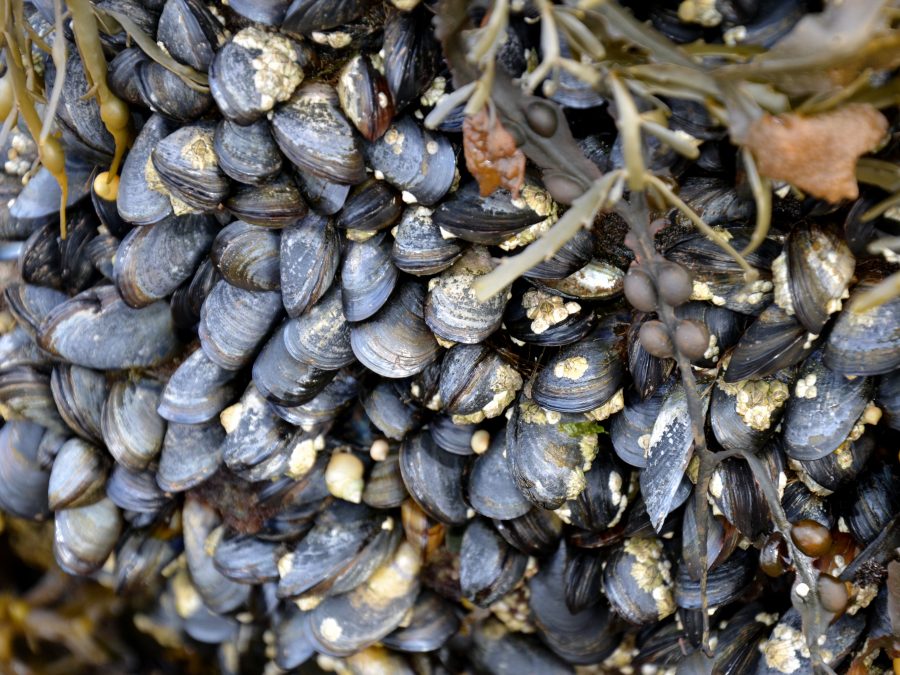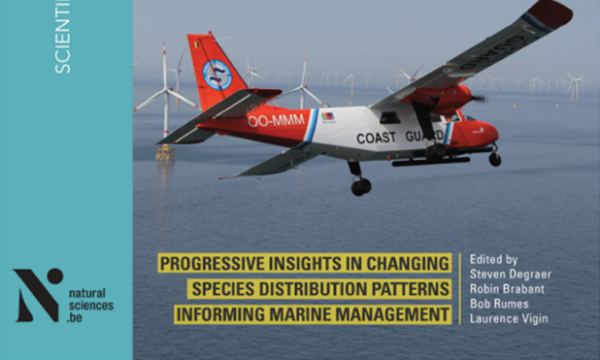Press release One step closer to seaweed, oyster and mussel farming in the Belgian North Sea

According to research by UGent, ILVO, Belwind, Brevisco, C-Power, Colruyt Group, DEME Group, Lobster Fish, OD Natural Environment and Sioen Industries, culturing seaweed and shellfish in the Belgian North Sea is biologically feasible. The economic feasibility depends on tackling technical challenges.
After two years of experiments and research, the scientists and companies involved present the results of two aquaculture research projects at two different locations: near the coast of Nieuwpoort (oysters, seaweed and scallops - project Value@Sea) and further offshore, in the Belgian wind farms (mussels - project Edulis).
Watch the videos about the projects Value@Sea and Edulis below
Fleshy oysters and crispy seaweed
The Value@Sea project demonstrated for the first time that culturing flat oysters in the Belgian North Sea is both biologically and technically feasible. Also, it took the first steps towards seaweed farming in the Belgian part of the North Sea. After two growing seasons, oysters were grown to commercial size in bags and baskets. The cultivation of scallops turned out not to be feasible (yet) due to a lack of qualitative young shells to start with. Finally, the experimental cultivation of seaweed on vertically suspended textile mats proved the importance of the strength of the suspension installation and the choice of the technical textile.
"Technically and biologically speaking, we have acquired a lot of know-how, and the characteristics of the products are promising: the oysters are fleshy and the seaweed is firm and crunchy. The step towards mechanization and upscaling beyond scientific trials still needs to be taken. Only then will we know whether the activities can be economically feasible as well," states ILVO aquaculture expert Daan Delbare. "One particular issue is undesired spontaneous vegetation of the installations. We still need to find a solution to this problem, because it prevents good water flow - which supplies the animals with the necessary nutrients - and it makes the installations heavier.
Partner Brevisco confirms that Value@Sea has considerably boosted knowledge of this type of aquaculture, and that the collaboration within a broad consortium has proven to be fruitful. "As a supporting actor of all maritime technical activities related to our know-how, Value@Sea has strongly contributed to further sharpen our knowledge and expertise. Brevisco believes in the future of aquaculture at sea for various actors and sectors, by means of collaboration," says Stephanie Debels.
Technically and biologically speaking, we have acquired a lot of know-how, and the characteristics of the products are promising: the oysters are fleshy and the seaweed is firm and crunchy
Wind farms as suppliers of energy and mussels
The Edulis project has demonstrated that it is possible to cultivate mussels in wind farms 30 to 50 km off the Belgian coast, both on a biological and on a technical level. Wind farms could thus serve more than one purpose. The experiments resulted in a well-filled and tasty, high-quality mussel that complies with all food safety regulations. The yield is equivalent to that of hanging mussel culture in the Netherlands and Ireland, and the mussels grow faster than bottom culture mussels (hanging culture mussels are market ready in 15 months instead of 24).
The big challenge is to design installations that can withstand the often extreme conditions in the North Sea. According to the researchers, investing in robust, low-maintenance and safe systems, including boats, is a must, although this will up the overall production cost. In addition, it turned out that the size and organization of the existing wind farms is not optimal for food production, which makes sense as they were not designed for that purpose. The distance from the coast also poses a challenge for the technical, practical and economic feasibility. When designing future wind farms, these issues should be taken into account in order to be able to successfully combine both activities.
"Edulis has given us a clear picture of the costs and benefits of mussel farming in the North Sea," states Margriet Drouillon, Senior Business Developer for Aquaculture and Blue Life Sciences at Ghent University. "If we really aspire mussel farming on a commercial scale, we will need to put a lot of effort into developing knowledge on the economic feasibility of mussel farming in wind farms. We will also explore other options for multi-use of space at sea, while still aiming for sustainable production".
Edulis has given us a clear picture of the costs and benefits of mussel framing in the North Sea
Three challenges for aquaculture in the North Sea
Ghent University and Flanders Research Institute for Agriculture, Fisheries and Food (ILVO) launched the 'North Sea Aquaculture' project in 2017, with Edulis and Value@Sea as subsidiary projects. To do so, they joined forces with their partners Belwind, Brevisco, C-Power, Colruyt Group, DEME Group, Lobster Fish, OD Natural Environment and Sioen Industries. North Sea Aquaculture tackled three challenges:
- Innovative cultivation techniques for shellfish and seaweed;
- Efficient use of space in the Belgian North Sea;
- The development of a market for new marine regional products.
The project was funded using private funding, Flemish and European support.
More information
More detailed information and a video can be found in the press releases:
- Edulis: cultivation of mussels in the open sea between wind turbines
- Sea farm Value@Sea: successful technical trials with oysters and seaweed, but scallops not (yet) feasible
Be sure to contact the spokespeople if you require more information.



